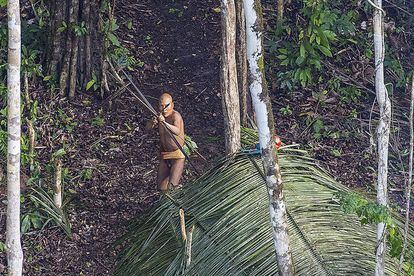An indigenous Brazilian on the Humaitá river, in the state of Acre, photographed from a helicopter in 2016.RICARDO STUCKERT
In Brazil there are approximately 114 indigenous groups outside the political game in Brasilia. The news about the approval of Bill 490/2007 by the Constitution and Justice and Citizenship Commission of the Chamber of Deputies has not reached their villages, located in the depths of the Amazon, this Tuesday. They are also unaware of the term “bancada ruralista”, which, together with the government base, was responsible for sanctioning the initiative, which represents a setback for the rights of all the original peoples of Brazil. Although they are unaware of the legislative procedures, for these 114 isolated indigenous groups, the approval of the bill could lead to their extinction, according to experts consulted by EL PAÍS. These communities, of their own free will, have not had contact with society for centuries,although they live under pressure from the advance of logging companies, illegal miners and agribusiness. The text must be approved by the full House before going to the Senate.
The drafting of the project opens the possibility for these peoples to be contacted against their will. "In the case of isolated indigenous peoples, the State and civil society must absolutely respect their freedoms and traditional means of life, and contact must be avoided as much as possible, except to provide medical assistance or mediate a state action of public utility", the text says, without specifying what that "state action of public utility" would be. Juliana de Paula Batista, a lawyer from the Socio-environmental Institute, explains the change: “The 1988 Constitution guarantees indigenous people their uses and customs. For this reason, since the re-democratization of the country, the policy with isolated peoples is not to establish contact, since they deliberately choose to remain apart ”. According to Batista,"What the bill does is put an end to this policy and foresee forced contacts through an abstract and generic concept such as 'state action of public utility', which can encompass anything".
This unwanted contact by isolated peoples opens the door to their "genocide," says Batista. Living in isolation, they are communities without immunological memory, so they are susceptible to any type of disease. “They are very risky contacts. We have historical accounts prior to the 1988 Constitution of groups that were decimated by the flu and other epidemics less than 48 hours after being contacted, ”he explains. Currently there is a specific health protocol and regulations to approach isolated groups, in case of accidental contact or if these indigenous people express their desire to establish contact. "This approach follows a series of sanitary and anthropological precautions and has a multidisciplinary team," explains the lawyer.Any initiative of this type must go through the Special Secretariat for Indigenous Health of the Ministry of Health.
But with the approval of the bill, the contact could be made by "private, national or international entities", provided that the State hired them for that purpose. “That could lead to contact being made by inexperienced institutions. In this way, in theory, a radical evangelical group interested in evangelizing these groups or a mining company that wants to exploit their lands could be the ones to approach the isolated Indians, ”says Batista. There are already records of evangelical missions that want to catechize the indigenous people and advance the urbanization project of various parts of the Amazon.
In Peru, there is legislation similar to Bill 490 that allows private companies to come into contact with uncontacted Indians. The result is a very high human cost, which has even pushed some indigenous Peruvians to flee to the Brazilian Amazon, especially in the region of the State of Acre. “Imagine that Eletrobras, responsible for the Belo Monte hydroelectric plant, was in charge of approaching isolated villages. It would be disastrous, ”says Carolina Santana, a lawyer with the Observatory for Human Rights of Isolated and Newly Contacted Indigenous Peoples, who worked for 10 years at the National Indigenous Foundation. "I do not believe that a forced contact, which does not occur at the initiative of these peoples, brings them any benefit," he says.
The project establishes a temporary legal framework to demarcate indigenous lands. Indigenous peoples would have to prove that they occupied the claimed region before the date of promulgation of the 1988 Federal Constitution, which would represent a problem for isolated peoples if contacted. “How could an isolated indigenous person prove it? They have no contact with the national society. How could they attest to their presence in a place before 1988? ”, Asks Batista.
The Supreme Federal Court could also reject this bill. In the coming weeks, he will analyze the case of the land demarcation of the Xokleng people in the State of Santa Catarina, which is also related to the problem of the time frame and could affect Bill 490, since the decision would apply to all similar cases. Justice Edson Fachin has already announced his vote in favor of the Xokleng people.
Bill 490 is not the first precept processed during the Bolsonaro government that weakens isolated indigenous peoples. In July 2020, the president sanctioned Law 14,021, which, in one of its articles, allows missionaries to stay in the lands of isolated towns, provided they have the approval of medical teams. "Missions of a religious nature that are already in indigenous [isolated] communities must be evaluated by the responsible health team and may remain with the approval of the responsible doctor," the text says. The Supreme Federal Court must shortly analyze a Direct Action of Unconstitutionality filed by the Articulation of Indigenous Peoples of Brazil against this law.
Subscribe here to the
EL PAÍS América
newsletter
and receive all the informative keys of the current situation in the region.

